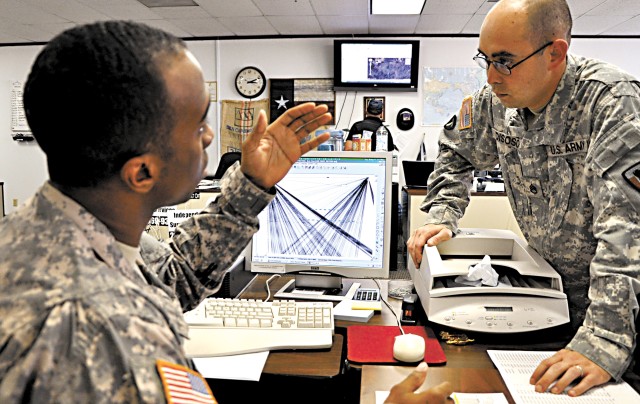FORT SAM HOUSTON, Texas -- Buddha-like, Staff Sgt. Paul Roberts clears his mind and focuses intently on an array of lines crisscrossing his computer screen.
The array is a pictorial representation of telephone calls he is tracking. The grid illustrates the links and identifies both originator and receiver of each of the calls.
As the diagram forms, Roberts sifts through the raw data on his call-pattern organizational chart looking for relationships between callers that may suggest a criminal network.
He methodically eliminates each non-essential call, then provides the results to Drug Enforcement Administration investigators collecting evidence against criminals violating controlled substance laws.
"They might need information or a background check," Roberts explained. "I help facilitate their needs so they can stay out in the streets long enough to speed up their cases."
Roberts is deciphering call patterns among his other duties for the DEA in an effort to redraw the blueprint of his life.
While serving as a military policeman in Afghanistan, a roadside bomb blew up his truck. He and another member of his four-man team lived through the initial blast, but Roberts ended up as the only survivor.
"I lost my gunner there and I lost my interpreter there. Then my driver died five days later," he said.
Roberts was knocked unconscious from a blow to his skull and suffered third-degree burns across the backs of his legs.
Recovering at Brooke Army Medical Center, Roberts said he still has trouble multi-tasking and processes information more slowly. He takes notes to tweak his memory.
His Army career is on hold as a result of his injuries.
"My dream was to become a sergeant major. I always wanted to do my 20 years plus. But if the military says that's it, then I have to grab my boots and my rug and take it to the civilian world."
Even with challenges Roberts and others in the Warrior Transition Battalion at Brooke Army Medical Center have options. Several agencies such as DEA offer internships to wounded warriors.
The DEA internships have been in place for just one year and already six Soldiers have passed through the pipeline. Several applied for permanent employment with the agency.
"This was one of the first offices nationwide to become part of the program," said Mauricio Fernandez, assistant special officer in charge of the San Antonio District Office of the Drug Enforcement Administration.
Fernandez' office is responsible for over 4,700 square miles stretching from the Mexican border to northern Texas including the cities of San Antonio, Austin, Waco, and Dallas; and encompasses 52 counties.
A former Marine, Fernandez said the DEA internships were founded because of the gratitude he and others in the agency had for those in the military. Many are prior military.
"(The) fact is that without these young men and women in service, our roles in the civilian world would not exist," Fernandez said.
"It's a win-win arrangement. Having them here is a great asset," said Tim Cahill, an enforcement group supervisor for both task force officers and DEA agents. "They help us with their work product and their spirit. The way these guys are fighting and recovering - their attitudes, it brings up the morale in my group."
Two types of internships are available at DEA for wounded warriors: intelligence analyst and a technical position working with radio, communications gear and photography.
A military security clearance already in place allows WTB Soldiers to do things a civilian intern could not, Cahill said.
"Depending on their military occupational specialty, they may have done these types of things - intelligence gathering for instance."
Soldiers applying for an internship must build a resume and submit it using http://www.usajobs.gov, be selected and go through an interview.
Once selected, warriors receive a two- to four-week indoctrination and/or basic training. Evaluations are done every two weeks.
"We try to make it as real world as possible and we want them to feel they are contributing members of our team," Cahill said, adding that a support system is also part of the program.
Roberts explained he learned to turn his challenges into assets at DEA. His trouble with multi-tasking actually helps him read call patterns.
"I lock onto one thing," he explained. "It helps me find the finer lines in the work."
Although he is not out patrolling, Roberts is still in the fight catching criminals.
"The things I do now as an intel analyst are something I've come to love," Roberts said. "It's a great day when we get the bad guy and pull a lot of bad stuff off the street."
Related Links:
U.S. Army Wounded Warrior Program
STAND-TO!: Army Wounded Warrior Program: Marking Five Years of Service


Social Sharing